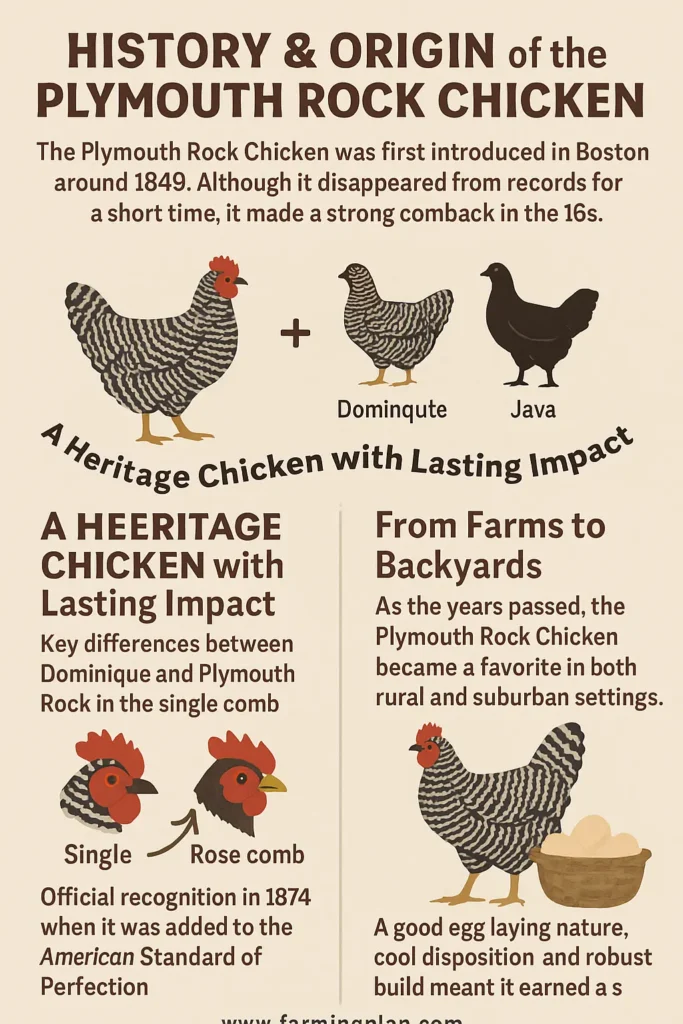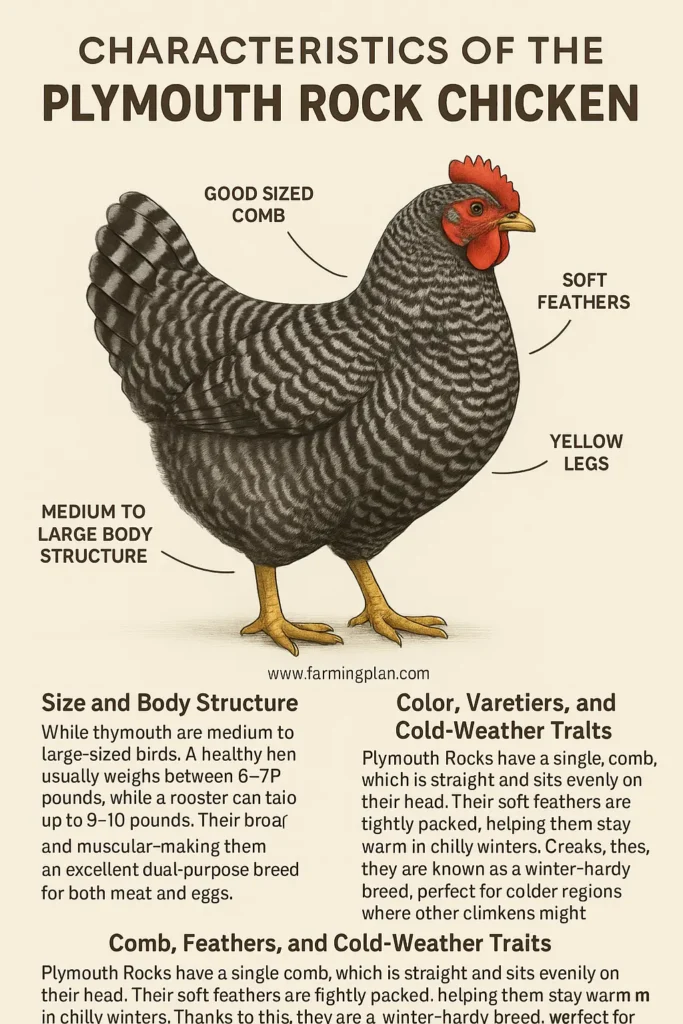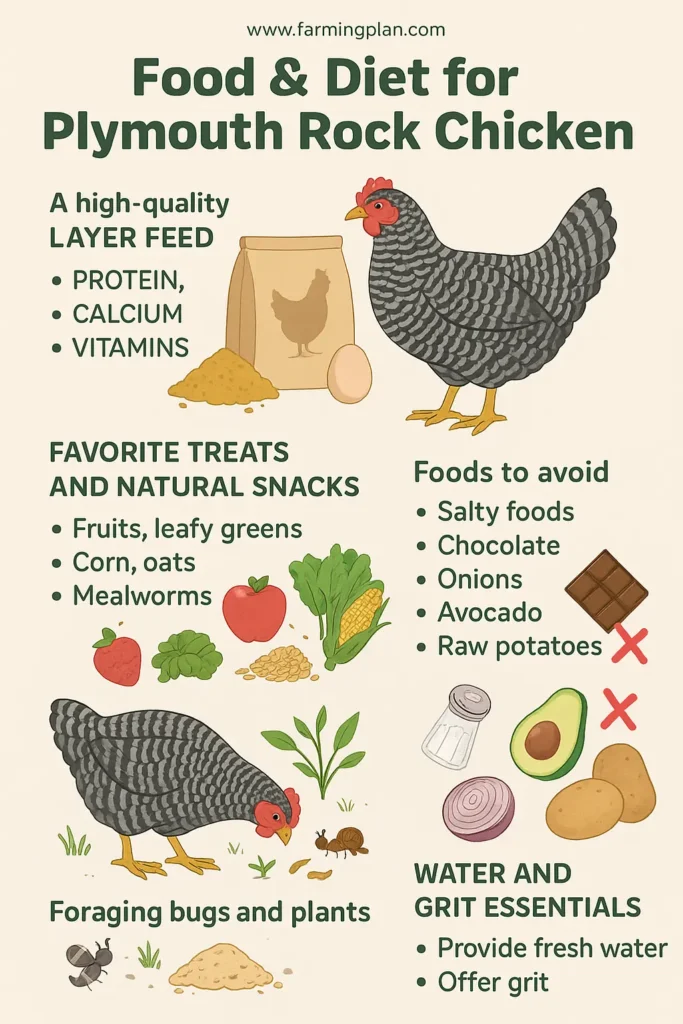The Plymouth Rock Chicken is a classic American breed known for its calm temperament, striking black-and-white barred feathers, and excellent egg-laying ability. First introduced in the 19th century, this hardy bird quickly became a favorite for backyard chicken keepers, hobby farmers, and breeders across the country. Whether you’re starting your first flock or adding to an existing one, Plymouth Rock Chickens are a fantastic choice thanks to their friendly nature, cold weather tolerance, and ability to thrive in a range of environments. Often called the Barred Rock, this breed is not only beautiful to look at but also easy to care for, making it perfect for families, beginners, and seasoned poultry enthusiasts alike.

History & Origin of the Plymouth Rock Chicken
The Plymouth Rock Chicken was first introduced in Boston around 1849. Although it disappeared from records for a short time, it made a strong comeback in the 1860s. Breeders created this dependable bird by crossing Dominique chickens with Java birds, which led to a new, eye-catching striped feather pattern and a strong, healthy body. This unique mix gave rise to the well-known Barred Plymouth Rock variety.
Read More: Delaware Chicken: Farming Business
A Heritage Chicken with Lasting Impact
One of the key differences between the Dominique and the Plymouth Rock is the comb—Plymouth Rocks have a single comb, while Dominiques have a rose comb. This feature helped the Plymouth Rock stand out as a separate breed and earned it official recognition in 1874 when it was added to the American Standard of Perfection. Its popularity quickly grew, and it became one of the most trusted chickens for American farmers.

From Farms to Backyards
As the years passed, the Plymouth Rock Chicken became a favorite in both rural and suburban settings. The good egg laying nature, cool disposition and robust build meant it earned a solid place among Barred Rock breeders, backyard chicken keepers, and homesteaders. Nowadays it is a classic choice for all who want a good friendly chicken breed.
Read More: Derbyshire Redcap Chicken: Farming
Characteristics of the Plymouth Rock Chicken
The Plymouth Rock Chicken is easy to recognize, especially the popular Barred Plymouth Rock variety. These birds have famous black and white striped feathers making a very attractive zebra-like pattern. Their plumage is soft, clean, and full giving them a charming look in any flock. They have one good sized comb which is of moderate size, a bright red wattle and yellow legs which makes them look proud and healthy.
Size and Body Structure
These chickens are considered medium to large-sized birds. A healthy hen usually weighs between 6–7 pounds, while a rooster can weigh up to 9–10 pounds. Their bodies are broad and muscular, making them an excellent dual-purpose breed for both meat and eggs. Despite their size, they’re still friendly and easy to handle, even for beginners.

Color Varieties and Feather Patterns
While the Barred Rock Chicken is the most recognized, the breed comes in several color varieties, including White, Buff, Partridge, Silver Penciled, Blue, and Columbian. However, the barred feather pattern remains the most popular due to its unique and attractive look. These birds have colored plumage that helps them blend well in free-range environments while still standing out in a backyard flock.
Comb, Feathers, and Cold-Weather Traits
Plymouth Rocks have a single comb, which is straight and sits evenly on their head. Their soft feathers are tightly packed, helping them stay warm in chilly winters. Thanks to this, they are known as a winter-hardy breed, perfect for colder regions where other chickens might struggle. Their feathering also keeps them comfortable in dry and moderate climates.
Read More: Holland Chicken: The Ins and Outs of Successful
Nature & Temperament of the Plymouth Rock Chicken
The Plymouth Rock Chicken is known for its calm temperament and friendly nature. These birds enjoy being around people and often follow their owners around the yard. They rarely act skittish or aggressive, making them a perfect choice for families with children or first-time chicken keepers.
Social and Easy to Handle
This breed fits well in a mixed flock and gets along with other chickens. They’re not overly dominant, which helps keep the flock peaceful. Their gentle attitude makes them excellent flock mates, especially in a backyard setting. Whether you’re raising them with other breeds or as part of a small group, Barred Rock hens help create a harmonious flock.
Great for Beginners and Hobbyists
If you’re new to chicken keeping, the Plymouth Rock Chicken is a great starter bird. They’re easy to manage, respond well to human interaction, and don’t mind being picked up. Many backyard chicken keepers say these birds are among the most friendly chickens they’ve owned. Their predictable behavior also helps when managing routines like feeding and egg collection.
Active but Not Noisy
These birds enjoy roaming freely but are not overly energetic or loud. They excel in free range but also do well in enclosed coops. Their activity to calmness ratio suits them for both urban and rural chicken families. They’re always on guard but few are disruptive.
Food & Diet for Plymouth Rock Chicken
To keep your Plymouth Rock Chicken healthy and productive, start with a high-quality layer feed. This should include the right balance of protein, calcium, and vitamins to support strong eggshells and regular laying. Look for feed with at least 16% protein and added calcium, especially for barred rock hens during egg-laying season.
Favorite Treats and Natural Snacks
These chickens love treats like fruits, leafy greens, corn, oats, and mealworms. They also enjoy foraging for bugs and plants if given outdoor space. Allowing your birds to roam in a free-range environment gives them access to natural snacks that support their health and natural behavior. Just make sure treats only make up 10% of their diet.

Foods to Avoid
Avoid feeding your Plymouth Rock poultry salty foods, chocolate, onions, avocado, or raw potatoes. These items can upset their digestive system and even be toxic. Also, stay away from moldy or spoiled food. A clean diet means healthier birds and better egg quality.
Water and Grit Essentials
Always provide fresh, clean water. Dehydrated chickens eat less and stop laying. Also, offer grit (small stones) to help them digest food properly, especially if they’re eating grains or foraging outside. Without grit, their digestion may slow down, causing problems.
“A well-fed hen is a happy hen—give her a balanced diet, and she’ll thank you with better eggs.”
Usage & Purpose of the Plymouth Rock Chicken
The Plymouth Rock Chicken is prized for its consistent egg-laying ability. A healthy Barred Rock hen can lay around 200 to 280 large, brown eggs per year. Their dependable egg production, even in colder months, makes them a fantastic choice for backyard chicken keepers who want fresh eggs all year round.
A Dual-Purpose Breed
Known as a classic dual-purpose chicken breed, the Plymouth Rock is raised for both eggs and meat. Hens are excellent layers, while roosters and older birds have enough muscle and weight to provide quality meat. This makes the breed perfect for small farms or homesteads focused on sustainable living.
Great for Backyard Flocks and Families
Thanks to their calm temperament and friendly nature, these birds are great with kids and work well in family settings. Whether you’re building your first backyard flock or expanding an existing one, the Plymouth Rock Chicken fits right in. They’re easy to care for and bring joy with their gentle personality and attractive appearance.
Used in Cross-Breeding
Plymouth Rocks are also valued by barred rock breeders for their role in cross-breeding. When crossed with other breeds, they help pass on desirable traits like good plumage, winter hardiness, and strong egg-laying. Their genes participate in the creation of other useful chicken varieties such as the broiler chicken.
Special Features of the Plymouth Rock Chicken
One of the most striking special features of the Plymouth Rock Chicken is its iconic barred feather pattern. The combination of black and white stripes, often referred to as “zebra-like,” sets this breed apart from other chickens. The striped feather pattern makes them not only a great and gorgeous sight but also perfect cover in free-range habitats helping this bird to hide in nature.
Winter Hardiness
The Plymouth Rock Chicken is known for its ability to withstand colder months, making it a favorite in chilly winters. Their dense feathering, especially in the Barred Rock variety, helps them stay warm in harsh winters while still maintaining their egg-laying abilities. This winter-hardy trait makes them an ideal choice for areas with colder climates, where other breeds might struggle.
Friendly and Easy to Handle
Having a placid nature and nature friendly, Plymouth Rock Chickens is one of the best pets and it is nice handling them. They are particularly useful for beginners and children, due to being naturally sociable and loving their interactions with human beings. This breed is commonly given as friendly and gentle, and their tendency to be friendly with other chickens puts it on top of any flock.
Versatility in Use
A dual purpose breed the Plymouth rock provides the best of both worlds: Make it reliable egg production and quality meat. Whether you want to lay eggs to your family, or rear birds for meat, Plymouth Rock is a good bird. Their all around nature makes them flexible and good for any farm or back yard flock.
Health Issues & Prevention for Plymouth Rock Chickens
Although Plymouth Rock Chickens tend to be hardy and tough as all chickens are liable to certain health problems. The most common of the problems are the respiratory infections, which can advecting their breathing. Coughing, nasal discharge and also lethargy may be signs. The other problem is lice or mites that may cause irritation and weight loss. Be alert for any bizarre activity- or physical signs of discomfort.
Egg-Laying Problems
Some hens may experience egg-laying issues, particularly if they are stressed, have poor nutrition, or are older. Soft-shelled eggs or egg binding (when an egg gets stuck inside) are common issues. A balanced diet with enough calcium and a stress-free environment can help prevent these problems. If your hen is having trouble laying, consult a vet to rule out any serious conditions.
Prevention of Diseases
The healthiest way to keep your Plymouth Rock Chicken is a clean living environment. Maintain cleanliness in the coop moving the bedding regularly and preventing buildup of waste. Good hygiene helps prevent the spread of diseases like coccidiosis and salmonella. Additionally, keep your chickens’ water clean and provide them with a balanced diet to maintain their overall health.
Vaccinations and Regular Checkups
Though not necessarily all chickens require vaccinations, it would be wise to discuss common poultry diseases’ vaccinations with your vet from time to time. Such regular checkups will also help keep your barred rock hens in peak conditions. Prevention is always better than treatment, so staying on top of their care can save you from potential health issues down the line.
Step-by-Step Farming Guide for Plymouth Rock Chickens
The Step-by-Step Farming Guide for Plymouth Rock Chickens provides clear, actionable advice for raising this versatile breed. First establish a large well ventilated coop which protects your chickens from the elements especially in winter. Make sure that your chickens have a safe free range area to forage in and this should be fed with high quality and water daily.Regularly check for health issues, maintain a clean coop, and monitor egg production to ensure your Plymouth Rock poultry stays healthy and productive.
Step 1- Setting Up the Coop
For Plymouth Rock Chickens raising, a comfortable and secure coop is necessary. Make sure that the coop is big enough, at least 3-4 square feet per bird. The Barred Rock Chicken, although it likes to roam, needs a safe place to sleep and lay the eggs. Ensure the coop is properly ventilated, dry and non drafty especially when it’s comparatively colder. Adding roosting bars will give your chickens a comfortable place to sleep off the ground, and laying boxes should be placed at a convenient height for easy access.
Step 2- Creating a Safe Free-Range Environment
If you plan to let your Plymouth Rock Chickens roam outside, be sure to create a safe and secure free-range environment. The birds enjoy foraging for bugs, plants, and seeds, but they also need protection from predators like hawks and raccoons. A securely fenced area with adequate shelter for shade and protection from the elements is essential. Barred Rock hens are great foragers, and giving them access to a variety of natural food helps keep them healthy and happy.
Step 3- Daily Care and Feeding
To keep your Plymouth Rock poultry in good health, provide fresh water and high-quality chicken feed daily. Be sure to check their food and water every morning, as chickens tend to drink and eat regularly. Supplement their diet with healthy treats like leafy greens, berries, and mealworms. Clean their feeding containers regularly to prevent contamination and promote good digestion.
Step 4- Managing Egg-Laying
As your Plymouth Rock Chicken reaches maturity, you’ll notice them starting to lay eggs. Collect eggs daily to keep them clean and prevent breakage. Make sure their nesting boxes are filled with soft bedding, such as straw or wood shavings, to encourage comfortable egg-laying. Because Plymouth Rock Chickens are good egg layers, you may want to monitor their egg production to see to their health.
Step 5- Health Maintenance and Monitoring
Routine health checks are a vital part of caring for Plymouth Rock Chickens. Look out for signs of illness such as lethargy, loss of appetite, or abnormal behavior. Regularly check for external parasites like lice or mites and treat them promptly. It’s also important to monitor their comb and wattles for signs of infection or frostbite, especially during colder months. Regularly cleaning the coop and changing bedding helps prevent the spread of diseases.
Expert Tips & Best Practices for Plymouth Rock Chickens
Among the best ways to make your Plymouth Rock Chicken survive is to maintain its balanced diet. Layer feed is important; but don’t forget to top off your rabbit’s diet with fresh greens, fruits and protein-rich treats such as mealworms. Clean water must always be available to avoid loss in egg production due to dehydration. Regularly check their diet to make sure they’re getting enough calcium, especially for egg-laying hens like the Barred Rock hen.
Create a Stress-Free Environment
Chickens are sensitive to stress, which can affect their egg production and overall health. To maintain a stress-free environment, keep your Plymouth Rock poultry in a calm, clean space. Minimize loud noises, sudden changes, or overcrowding in the coop. A peaceful flock is a productive flock, and your chickens will reward you with consistent egg-laying and a happy demeanor.
Regularly Inspect for Parasites
Chickens are prone to external parasites like lice and mites, which can cause discomfort and affect their health. Make it a habit to check your Plymouth Rock chickens regularly for signs of parasites, such as feather loss, itching, or visible bugs. If you notice any problems, treat them promptly using poultry-safe treatments. Keeping the coop clean and dry will also help reduce the risk of parasites.
Provide Enrichment for Happy, Healthy Chickens
Chickens are intelligent birds that enjoy mental stimulation. Provide your Plymouth Rock Chickens with enrichment activities like dust baths, which they use to clean their feathers and keep parasites at bay. You can also give them toys or scatter their food to encourage foraging behavior, which will keep them active and entertained.
Monitor Egg-Laying Patterns
As Plymouth Rock Chickens are known for their consistent egg-laying abilities, it’s important to monitor their laying patterns. If you notice a sudden drop in egg production, check for possible stressors, such as changes in diet, environment, or health. Regularly inspect their nests to ensure they are clean and comfortable, as a clean environment helps promote steady egg production
FAQ
What is the lifespan of a Plymouth Rock Chicken?
Plymouth Rock chickens typically live between 6 to 12 years, depending on their care and environment. Proper nutrition and a safe living space can help them reach the upper end of this range.
How many eggs do Plymouth Rock hens lay annually?
A healthy Plymouth Rock hen can lay approximately 200 to 280 large, brown eggs per year, making them reliable layers for backyard flocks.
Are Plymouth Rock chickens good for beginners?
Yes, their calm temperament and friendly demeanor make Plymouth Rock chickens an excellent choice for first-time chicken keepers. They adapt well to various environments and are easy to handle.
Do Plymouth Rock chickens tolerate cold weather?
Yes, they are known for their winter hardiness. Their dense feathering helps them stay warm during colder months, though roosters’ large combs may be prone to frostbite.
What is the temperament of Plymouth Rock chickens?
Plymouth Rock chickens are known for their docile and gentle nature. They are friendly, easy to handle, and get along well with other chickens, making them great additions to any flock.
Conclusion
The Plymouth Rock Chicken is a versatile and friendly breed, ideal for both novice and experienced poultry keepers. With their consistent egg production, attractive plumage, and calm demeanor, they make excellent additions to any flock. Whether you’re seeking reliable layers or friendly pets, Plymouth Rocks offer a balance of productivity and companionship. Their adaptability to various climates and ease of care further enhance their appeal, ensuring they thrive in diverse environments.

